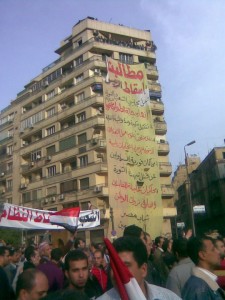Statement of President Barack Obama on Egypt
The Egyptian people have been told that there was a transition of authority, but it is not yet clear that this transition is immediate, meaningful or sufficient. Too many Egyptians remain unconvinced that the government is serious about a genuine transition to democracy, and it is the responsibility of the government to speak clearly to the Egyptian people and the world. The Egyptian government must put forward a credible, concrete and unequivocal path toward genuine democracy, and they have not yet seized that opportunity. Read more
In the Middle East, a Catch-22 for the CIA
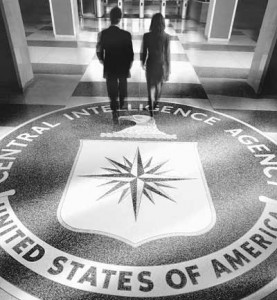 By David Ignatius
By David Ignatius
Thursday, February 10, 2011
The CIA uses the term “liaison” to describe its contacts with foreign intelligence services. And in Arab capitals such as Tunis, Cairo and Amman, these relationships can be so seductively beneficial that they limit the CIA’s ability to run its own “unilateral” operations to learn what’s going on inside the host country.
This conundrum – how to work with your hosts and also spy on them – is one of the difficulties facing the CIA as it tries to understand the youth revolution spreading across the Middle East. The agency has cultivated its relationships with people such as Gen. Omar Suleiman, Egypt’s chief of intelligence and now vice president, but it has not done as well understanding the world of the protesters. Read more
المشروع السياسي لثورة الأحرار في مصر
مثلت ثورة الأحرار في مصر و ما زالت صدمة لكل من يتابع الشأن المصري، و حيث أن الشأن المصري هو بطبيعة الحال شأن إقليمي و دولي فإن تبعات ثورة الأحرار في مصر تتجاوز القطر و الإقليم لتترك أثراً بالغاً على الكثير من الملفات و الشؤون الإقليمية و الدولية.
و عموماً فإنني لا أرى مبرراً لهذه الصدمة و الذهول، فكل من تابع أوضاع مصر و عايش الواقع المصري لربما كان أكثر صدمة و ذهولاً أنها لم تقم قبل الموعد الذي إندلعت فيه، و أنها لم تأخذ منحى أكثر تصعيداً.
الأطراف المعنية:
تفاوتت ردود الأفعال و بالتالي سرعة التأقلم مع الحدث لدى كل من الأطراف الرئيسية المعنية. و من الأهمية بمكان دراسة إنعكاسات الثورة المصرية على كل طرف، و موقف كل طرف منها لإستشراق مستقبل الثورة و ضمان نجاحها كنموذج حضاري تحرري تقدمي، ليس فقط لشعب مصر البطل بل لكل الشعوب المقهورة في مشارق الأرض و مغاربها.
يمكن تلخيص أهم الأطراف المؤثرة و المتأثرة بالثورة المصرية في ثلاثة أطراف رئيسية:
أولاً: الشارع المصري و يشمل جماهير الشارع و الحركات الشبابية و الأحزاب السياسية و الجماعات.
ثأنياً: النظام المصري Read more
The Torture Career of Egypt’s New Vice President
In response to the mass protests of recent days, Egyptian President Hosni Mubarak has appointed his first Vice President in his over 30 years rule, intelligence chief Omar Suleiman. When Suleiman was first announced, Aljazeera commentators were describing him as a “distinguished” and “respected ” man. It turns out, however, that he is distinguished for, among other things, his central role in Egyptian torture and in the US rendition to torture program. Further, he is “respected” by US officials for his cooperation with their torture plans, among other initiatives.
Massacre at Tahrir
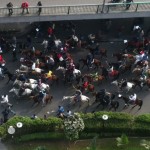 By Nicholas Kristof, New York Times, February 2, 2011
By Nicholas Kristof, New York Times, February 2, 2011
Pro-government thugs at Tahrir Square used clubs, machetes, swords and straight razors on Wednesday to try to crush Egypt’s democracy movement, but, for me, the most memorable moment of a sickening day was one of inspiration: watching two women stand up to a mob.
I was on Tahrir Square, watching armed young men pour in to scream in support of President Hosni Mubarak and to battle the pro-democracy protesters. Everybody, me included, tried to give them a wide berth, and the bodies of the injured being carried away added to the tension. Then along came two middle-age sisters, Amal and Minna, walking toward the square to join the pro-democracy movement. They had their heads covered in the conservative Muslim style, and they looked timid and frail as thugs surrounded them, jostled them, shouted at them. Read more
Square of Angels
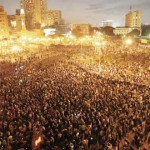 by Mariam Abada on Thursday, February 3, 2011 at 1:24pm
by Mariam Abada on Thursday, February 3, 2011 at 1:24pm
I just came back from Tahrir Square on my way to ease the horrible sense of guilt I felt for not having been there with them during the dark hours when they were being mercilessly attacked by the mercenaries…
My friend and I thought those heroes needed food, water, and medical supplies; however, upon reaching there, we realized they had all had their breakfast (consisting of dry bread and cheese mostly, not Kentucky) and that they had already been supp Read more
Extremism and How to Deal With It
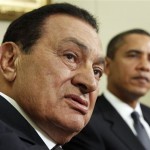 By Nidal Sakr
By Nidal Sakr
June 4, 2009 – It is no secret that I love Arabic, perhaps just as much as I despise Arabism. Arabic is the expression of the Quran – the Great Book of Civilization, while Arabism is a reminder to some longest lasting and senseless wars that predated Islam. Today Arab kingdoms, republics, and emirates are none but exaggeration in Arabism, and have no relevance to Arabic except for a name assigned to the country by its ruler.
Some of what I like about Arabic is its precision to differentiate meanings between lingual and referential. Linguistically, “Extremism” is an exaggeration in that which people agree as ordinary. Referentially, extremism is excess in understanding and interpretation of that which is acceptable by people, to that which is unacceptable by people. Read more
Beyond Fear and Anger
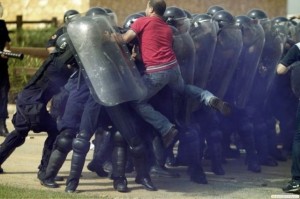 “U.S. and the Muslim World” By Nidal Sakr*
“U.S. and the Muslim World” By Nidal Sakr*
Years before Oslo and Madrid, as president of Muslim Student Association in some US university, I took part in a three-way meeting with a Quaker minister and a Jewish Rabbi. The meeting agenda was to discuss prospects for a two-state solution in Palestine. The moderator minister talked for about 30 minutes, then the Rabbi followed suit, each talking from his own ”religious” perspective. Before I had the chance to talk, the moderator announced “we all seem to agree, so let’s move on to solution.”
Book Released: Occupation of the Territories-Israeli Soldier testimonies 2000-2010
 Marking the tenth anniversary since the outbreak of the Second Intifada, Breaking the Silence releases a new publication: “Occupation of the Territories – Israeli Soldier Testimonies 2000-2010”
Marking the tenth anniversary since the outbreak of the Second Intifada, Breaking the Silence releases a new publication: “Occupation of the Territories – Israeli Soldier Testimonies 2000-2010”
Breaking the Silence is releasing a new publication, titled “Occupation of the Territories – Israeli Soldier Testimonies 2000-2010”, as part of the organization’s wider goal of increasing Read more
Tunisia’s Deposed President — Corrupt, Anti-Democratic, and One of America’s Close Friends
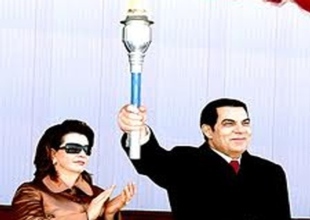 January 17, 2011 — Across the Middle East and Central Asia, U.S. allies are invariably corrupt dictators, maintained in power by lavish patronage and the military.
January 17, 2011 — Across the Middle East and Central Asia, U.S. allies are invariably corrupt dictators, maintained in power by lavish patronage and the military.
Officially, the Obama administration greeted Tunisia’s “Jasmine Revolution”—named after that country’s national flower—with open arms, calling for free and fair elections as the United States scrambled to get aboard the democratic bandwagon. Read more


